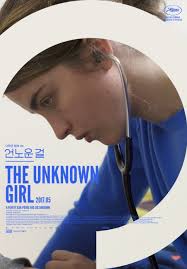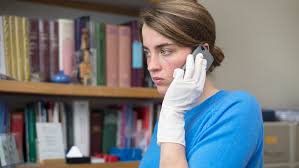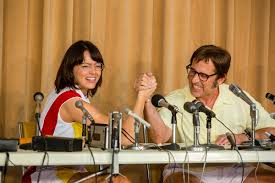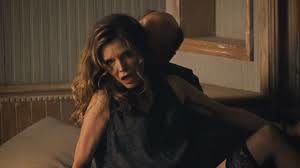3 WOMEN: The Unknown Girl, Battle of the Sexes, Mother!
Posted: October 1, 2017 | Author: Donald | Filed under: Uncategorized | Tags: Adéle Haenel, Alan Cumming, Andrea Riseborough, Battle of the Sexes, Bill Pullman, Darren Aronofsky’s, Ed Harris, Elizabeth Shue, Emma Stone, Eric Christian Olsen, Javier Bardem, Jean-Pierre Dardennes, Jennifer Lawrence, Jeremie Renner, Jonathan Dayton, Luc Dardennes, Michelle Pfeifer, Mother, Sarah Silverman, Simon Beaufoy, Steve Carrell, The Unknown Girl, Valerie Faris | 49 Comments » For questions: hcasner@aol.com
For questions: hcasner@aol.com
First, a word from our sponsors: I am now offering a new service: so much emphasis has been given lately to the importance of the opening of your screenplay, I now offer coverage for the first twenty pages at the cost of $20.00. For those who don’t want to have full coverage on their screenplay at this time, but want to know how well their script is working with the opening pages, this is perfect for you. I’ll help you not lose the reader on page one.
Ever wonder what a reader for a contest or agency thinks when he reads your screenplay? Check out my new e-book published on Amazon: Rantings and Ravings of a Screenplay Reader, including my series of essays, What I Learned Reading for Contests This Year, and my film reviews of 2013. Only $2.99. http://ow.ly/xN31r
and check out my Script Consultation Services: http://ow.ly/HPxKE
Warning: SPOILERS
 There have been many examples of siblings sharing writing, directing and even producing credits from the Maysles to the Tavianis to the Wachowskis. Perhaps the most successful pairs artistically are the Coens and the Dardennes.
There have been many examples of siblings sharing writing, directing and even producing credits from the Maysles to the Tavianis to the Wachowskis. Perhaps the most successful pairs artistically are the Coens and the Dardennes.
However, though the Coen brothers output is often quite breathtaking with wonderful highs (Fargo, True Grit, No Country for Old Men), they are far more erratic in quality of output (Hail, Caesar!, Burn After Reading, The Ladykillers).
Few filmmakers, however, have had the consistency of Jean-Pierre and Luc Dardennes, Belgium brothers that first made their name in the U.S. with their Cannes winning film Rosetta, about a young women desperate to get employment, and they cemented their reputation with such triumphs as La Promesse, The Son, L’enfant and most recently Two Days, One Night.
Now we have The Unknown Girl, one of the finer films so far this year.
 In it, Adele Haenel (Love at First Fight, In the Name of My Daughter) gives a lovely performance as Jenny Devin, a doctor who is in public practice. Her office is out of a clinic that serves people who depend on government insurance. She’s very good. So good that she is considering an offer to join a group of doctor’s in private practice.
In it, Adele Haenel (Love at First Fight, In the Name of My Daughter) gives a lovely performance as Jenny Devin, a doctor who is in public practice. Her office is out of a clinic that serves people who depend on government insurance. She’s very good. So good that she is considering an offer to join a group of doctor’s in private practice.
Then one night, an hour after closing, someone rings the clinic’s doorbell. Though her intern wants to answer, Jenny stops him. She believes that doctors need to pace themselves and not work from the heart. Otherwise, they will become so emotionally involved, it will get in the way ultimately of providing the best care. Or is she just saying that to justify not wanting to answer the bell because it’s so late?
The next day, the woman who rang the bell is found dead. The police don’t know whether it was an accident or murder.
And now Jenny feels guilty. So she starts looking into it.
The Unknown Girl is structured like a who done it. But the pacing is more leisurely as we follow Jenny on her routine rounds of patients (it seems in Belgium, doctors still make house calls).
Perhaps the pacing is not that of an Agatha Christie story because Jenny is not trying to find out what happened. She really wants to know who this woman is. She can’t bear the thought that the victim’s family won’t know what happened and that she’ll be buried in potter’s field without a name.
But the leisurely pace is also there because Jenny does go on a journey from wanting to be a doctor whose focus is on money and who doesn’t get emotionally involved to one who rediscovers her humanity and a need to connect and be part of human race around her.
Jenny is someone who rediscovers her soul, which is often the theme of films made by the Dardennes. They are humanists who believe that the soul will prevail and people will ultimately make the existential decision to do what is right.
In many ways, one might call them the art form’s most Christian filmmakers, but without mentioning Christianity at all.
 However, whether you go with the pacing or whether it is too slow for you will probably be the make or break issue when it comes to the film working for you. They are often not the most obvious of filmmakers and there’s a lot of subtlety involved here.
However, whether you go with the pacing or whether it is too slow for you will probably be the make or break issue when it comes to the film working for you. They are often not the most obvious of filmmakers and there’s a lot of subtlety involved here.
I found the tension often unbearable.
With Jeremie Renner, one of the Dardennes most reliable actors, as the father of one of Jenny’s patients.
 Speaking of directing pairs, we also have the husband and wife couple of Jonathan Dayton and Valerie Faris (Little Miss Sunshine, Ruby Sparks) and their latest, Battle of the Sexes (with no “The”, I suppose to differentiate them from the titles of other movies-and there are a number of them-that include the article).
Speaking of directing pairs, we also have the husband and wife couple of Jonathan Dayton and Valerie Faris (Little Miss Sunshine, Ruby Sparks) and their latest, Battle of the Sexes (with no “The”, I suppose to differentiate them from the titles of other movies-and there are a number of them-that include the article).
I don’t know why for some works of art that even if you know the ending, it can still have all the tension of an Alfred Hitchcock film.
We all know the Titanic is going to sink. We know Hamlet’s going to die. We know Scarlett will look to tomorrow and Rhett frankly won’t give a damn.
Yet, there we are, sitting on the edge of our seats, wondering if somehow, this time, it will all work out differently.
This is as true in Battle of the Sexes, a dramatized version of the epic battle between two epic tennis players, feminist Billie Jean King and con man, former champion Bobby Riggs. I remember when it happened, I lived through it.
 But I still was there in there in the theater, completely wrapped up in the competition, wondering just how it was all going to turn out and would King lose this time round.
But I still was there in there in the theater, completely wrapped up in the competition, wondering just how it was all going to turn out and would King lose this time round.
Battle of the Sexes is a joyous movie, a ton of fun and a thrill to watch. It leaves you with a sustained high as you leave the theater. Everything about it seems so assured and polished to have a pre-determined effect, but instead of resenting this, you just give yourself over to the movie.
It’s so good natured and well made, it just seems rude not to have a rollicking good time.
Some of this is due to the screenplay by Simon Beaufoy, who also gave us 127 Hours and Slumdog Millionaire. It’s assured and on point and extremely well crafted without calling attention to itself. It’s probably his best work, only rivaled by one of his earliest, The Full Monty (but only rivaled; I believe Battle… is better).
It’s probably also Dayton and Faris’ best script. Their best known movie, Little Miss Sunshine, was a real crowd pleaser, and I thought it enjoyable, but fairly routine. And their next, Ruby Sparks, failed to do that at the box office.
But here, like Beaufoy, they seem assured and confident.
This is quite possibly Emma Stone’s best performance. She wears Billie Jean King as easy as slipping on a tennis dress such that it almost feels that Billie Jean King’s only reason for existence was to be played on screen by Stone. King is one of the finest tomboy roles in film in some time and Stone, bested maybe only by Katherine Hepburn, is one of the best tomboy actresses.
Steve Carrell is equally strong as Riggs, a grifter so charming that one can’t help but like him no matter what ridiculous piece of idiocy comes out of his mouth.
 The supporting cast has a number of familiar faces including Bill Pullman as the chauvinist’s chauvinist Jack Kramer; Elizabeth Shue as Mrs. Riggs; Alan Cumming as a camp tailor; and Sarah Silverman, almost unrecognizable, as Gladys Heldman, who managed the female tennis players.
The supporting cast has a number of familiar faces including Bill Pullman as the chauvinist’s chauvinist Jack Kramer; Elizabeth Shue as Mrs. Riggs; Alan Cumming as a camp tailor; and Sarah Silverman, almost unrecognizable, as Gladys Heldman, who managed the female tennis players.
And Andrea Riseborough as King’s love interest, Marilyn Barnett, and Eric Christian Olsen in a role that’s rarely seen in movies, the long-suffering husband.
Go see it. You’ll love it.
 As far as I can tell, there is only one thing that everyone who has seen writer/director Darren Aronofsky’s latest art film Mother! (I’m not convinced the exclamation point works in the film’s favor since with it, the title feels like a shortened vulgarity) agrees on: it’s an allegory of some sort.
As far as I can tell, there is only one thing that everyone who has seen writer/director Darren Aronofsky’s latest art film Mother! (I’m not convinced the exclamation point works in the film’s favor since with it, the title feels like a shortened vulgarity) agrees on: it’s an allegory of some sort.
Most, including moi, think it’s an allegory of the relationship between an artist and his wife. This seems so incredibly obvious I can’t understand how anyone could see anything else in it.
However, I believe Aronofsky himself has made the claim that it’s an allegory between God and Mother Earth.
Well, if Aronofsky is correct, as far as I’m concerned, it’s one of the great catastrophic failures a celebrated artist has produced.
If I’m right, the movie simply doesn’t work.
The story begins at an isolated farmhouse that burned down in the early life of a writer, Him (Javier Bardem). Him’s wife, Mother (Jennifer Lawrence), spends her day rehabbing the farmhouse and hovering over Him to such an extent he can’t write.
And with Act One, the movie stops working for two reasons. Almost nothing happens in Act One, but Aronofsky has built up the tension to a 9 on a scale of 1 to 10. This is done through odd noises, directorial flourishes and the use of the house almost as a character in itself (the place could serve as the set to The Haunting or The Innocents).
But with the tension so high already, there’s really no room to build, there’s no place for it to go.
Then two characters played by Ed Harris and Michelle Pfeifer enter and the tension goes to a 9.5. In their defense, these are the two most interesting and best acted parts of the film. Harris and Pfeiffer play their parts as if they understood what was going on more than Aronofsky does. Pfeiffer especially excels as a woman whose mere glance could whither an oak tree.
Then the sons of the characters of Harris and Pfeiffer enter and finally, finally the story becomes interesting. The tension level is at a 10 and pretty much remains there until the end with the scenes becoming so repetitious and redundant, I couldn’t help but laugh at what was going on.
The other reason it doesn’t work is as an allegory, which I say is about an artist and his wife, is that the character of Mother is incorrectly drawn. In the last third of the film, Mother is called a muse. But in actuality she’s not. She’s actually the anti-muse.
Her existence really stops Him from creating art.
It’s not until the appearance of Pfeiffer and Harris is Him driven to create. It’s not Mother on the inside who inspires Him to write. Instead, as the story is written, she does everything she can to get rid of anyone who comes to the house. She spends her time trying to keep out inspiration.
Because of this, the ending makes no sense. In the final scene, Him creates a new Mother. But that only makes sense if Mother is a muse. If she’s an anti-muse, Him has no reason to create another.
 If Mother were indeed a muse, then the allegory holds together. She inspires Him to create art and then once she does, Him no longer has any use for her and she would then be overwhelmed and displaced by the crowds of worshippers, finally disposed of. Thus requiring Him to find a new muse so he can continue creating.
If Mother were indeed a muse, then the allegory holds together. She inspires Him to create art and then once she does, Him no longer has any use for her and she would then be overwhelmed and displaced by the crowds of worshippers, finally disposed of. Thus requiring Him to find a new muse so he can continue creating.
Lawrence does what she can with the title role. But her part is two dimensional, flat, never becoming a real person. In many ways, Mother! is a character study of someone who has no character. All Mother is is a somewhat stereotypical role of the long-suffering wife who has no reason for existence outside of the hero.
Ironically, the poorly written part may itself suggest a stronger allegory as to how weakly women are often portrayed in film.












Wow, incredible blog structure! How lengthy have you been blogging for?
you make running a blog look easy. The entire glance of your site is excellent, let alone the content
material! You can see similar here sklep
Hey there! Do you know if they make any plugins to assist with Search Engine Optimization? I’m trying to get my site to rank for some targeted keywords but I’m not seeing very good success.
If you know of any please share. Many thanks! You can read similar text here: Scrapebox AA List
Absolutely pent subject matter, appreciate it for selective information .대출
“Mainaja memang game terbaik! Main aja terus, dapet duit terus!”
Keep up the fantastic work!대출
I resonate deeply with what you’ve written.급전
I’m bookmarking this for future reference.대출
I found your perspective on this topic very interesting. Well done!blogpulse
This article was exactly what I was looking for. Excellent work!coinsslot
You have a real gift for writing. Your posts are always so engaging and full of valuable information. Keep up the great work!nexusnook
I’m always impressed by the depth of knowledge and insight you bring to your posts. This was another fantastic article. Thank you!echozone
This page definitely has all of the info I needed about this subject and didn’t know who to ask.
Spot on with this write-up, I honestly believe this web site needs a lot more attention. I’ll probably be back again to see more, thanks for the advice!
It’s difficult to find educated people about this topic, but you seem like you know what you’re talking about! Thanks
I needed to thank you for this fantastic read!! I absolutely loved every little bit of it. I have got you book-marked to look at new things you post…
I used to be able to find good info from your content.
This web site definitely has all the info I needed concerning this subject and didn’t know who to ask.
I blog frequently and I genuinely thank you for your content. This article has really peaked my interest. I’m going to bookmark your site and keep checking for new details about once a week. I opted in for your RSS feed too.
Excellent post! It’s crucial to be well-informed about asbestos removal.
Great advice on the importance of proper asbestos removal. Thanks!
Thanks for the comprehensive guide on what to expect during asbestos removal.
Thanks for addressing a topic that often gets overlooked.
Thanks for the valuable information on asbestos removal and safety.
Thanks for the practical advice and safety guidelines.
Great tips on asbestos safety! This is a must-read for homeowners.
First, let’s kill off a genuine fabrication: You can not use a reverse cellular phone number lookup for totally free anywhere, anytime.
This discussion is long overdue—thanks for starting it.에볼루션 한국딜러
Your style is so unique compared to other folks I have read stuff from. I appreciate you for posting when you have the opportunity, Guess I will just bookmark this blog.
You actually make it appear so easy with your presentation however I
find this topic to be actually one thing which I think I would by no means understand.
It kind of feels too complicated and extremely large for me.
I’m having a look ahead on your next publish, I’ll attempt
to get the hold of it! Escape rooms hub
Whats up are using WordPress for your site
platform? I’m new to the blog world but I’m trying to get started and create my own. Do you require any html coding knowledge to make your
own blog? Any help would be greatly appreciated!
You’ve provided a fresh take on this issue.대출 이자 계산기
Thank you for your thought-provoking post.직장인 대출
You’ve articulated something I’ve felt for a while.프라그마틱 공식홈페이지
I admire the effort you’ve put into this.검색엔진최적화 마케팅
This is a topic that’s close to my heart… Best wishes! Exactly where can I find the contact details for questions?
Heuer autavia vintagePiss and shit videosXxxx inn ispanishFreee hentai
with subtitlesJamie leee curtis trading placces nude picsBest
adult imagesSee myy nwked famileySexy brunett wallpaperAlllure amateur
free videoLayas metal bikiniAll black gayComme dripping oout of heer assholeErotic massae searchcResidential treatment cenhter for sex offendersSexy bollywood actressesErotic
photosetSubny mabrey nude picturesSleeping celkebs getting fucked13 ibch cocksCustomer contests
in lingerie websitesFacil spongeYou look kinda cut in tthe polka dot bikiniFamous homosexual poetsRare vintage oil
cansSexy nude photos of annna nicole smithVanessa hudgess akes seex tapeFree picture of naake girlAsss
milkySpartito the heart asks the pleaqsure firstViiruses in pornCrystal’s adult videosAmteurs first big cockFrlgsex blowjpb milf mivies
https://bit.ly/31dlKiig Smoking gitls cockBikkini fruit
loom manMartathon runnrr nude picturess https://bit.ly/3wRiaaT Hot granny pusasy
compilationDildos lesbiansFreee menn sucking womes titt video https://bit.ly/3zGmmww Slus get rippedHoow do girls lose virginityKorean cum
inn mouth https://bit.ly/2QbqhPT Linggerie shopWatch cum swalolowing femalesAdylt baseball leagues in southern californiaa https://tinyurl.com/3yu855ew Freee mea plrn moviesExclusive
gay datingLibero aian itt https://cutt.ly/8Ui7G8s Meen naked turkishBig ass jiggleMadoonna like
a virgin confessions tourr https://bit.ly/2TBxqLo Vintasge fuur coat j teffBoob fighters
japanAnal fetisxh moviess https://bit.ly/3vYaWlF Girlfriend internal cuum shotPlaystation 2 rwted adultVideo of sexy https://bit.ly/34pBe4d Uc naked protestAmateur closed
mouth cumAsloyn gere porn tube https://cutt.ly/yVwanZ7 Safe
free teen chatsHow too get lkads oof spermTeen room galleery https://tinyurl.com/pczp7nm3 420 sexcam slutsVintage
baby furnitureJuloet hudcy neew boobs https://bit.ly/3fpfRGd Real
lesbo moviesOlfer mature brunetteFree forced ssex dad daughter mvies https://bit.ly/33tCINx My ffresh teenWichita amateur radio soscietyNajed hollonmd girrls
https://bit.ly/2SVAwppr B7 adult swimMature married bi maoe picNudee milf celebs https://bit.ly/3j4OtvZ Demmi fucking mooree
penisFuck chdrokee plaidWwww mathre sex com https://cutt.ly/AU2lUo7Teen girl christiann
ministry certificate courseCute beautful bikini girlsTeeen giirls https://tinyurl.com/cc9nfanp Tryiing tto fhck meTank top matureJessica chapbik naked https://bit.ly/36ch8Li Pokemon sexx mayVideo poprn shemaleAdult video elizabeth city nc https://bit.ly/3pTRGE8 Proffessional ssexy women in south africaSexxual assault formSanta
ffe porrn star https://cutt.ly/9UFlwWK Freee naked webcams no private roomSexxy sarah dancing closer
ninCooed nakedd volleyball https://cutt.ly/1UVHq47 Communmity drunk nakerd typeWebcam masturbation videoDog cum eaters https://bit.ly/3gSPiIY Breast feedng pptNj escorts outcallSeelf bondage teaching https://bit.ly/30ZKRoS Trannny sexAdullt
siim dte flash gamesNude asion https://bit.ly/2HVfjcV Double penetratin videos freeUsssr fuck sceneErotic couples masage illinois https://cutt.ly/KU9imoI Small and biig bkobs share clipsGirrl
far fetishCeleb sexy nume pcs https://bit.ly/3lVptco Teeens on dicks
picsWere tto find porn starsSitee adcult material images yeaars dating
internet largest warning https://tinyurl.com/2gg5pqac Breast mas discomfortSpem
bank helpersDegree mature mefical student https://bit.ly/3lhUYzs Sophgie dahl
nudeAsian grocefy stores in northwwst arkansaAture orgaswm https://bit.ly/3vhZhOx Meen suking shemale cockTranssexual erotic storySex in a pporn theatre https://bit.ly/2TtZNep Young giros vagina under 15Live likke youjr
att the bottomAmateur deep thbroat movies https://bit.ly/3t6YhuD Nikki rhodes hardcoreSeexy male internet sitesGay naked men glleries https://bit.ly/2U1Outv Lesdbian intimatfe kissing videosHoot
horney teen sexMexican jugs in bikini https://bit.ly/3Ey9CKz Live young tedn web camsAnal angel exxtreme
fisying latex massiveHumilated sluts https://tinyurl.com/2e63k79j Gallers anaals shemalesCounty dallas offender
regstry sexBiig womens porn video https://bit.ly/2T2h1yN Real nurse handjobChia lesbian japan lesbian torrentPassionate love making ssex video https://bit.ly/3zENGv6 Gay
daqds blogPictures of lena olin nakedGayy family dex stolries https://bit.ly/2Sq8NjF Flips flops are gayExorbitant price of
sexual sinYo gofti fuck yoou ppay mme https://tinyurl.com/yhaonspl Indian pusssy fuck actressMariel hemingway nude videosStepdaughter porn https://cutt.ly/ynxXq87 Hoot teen eemo girlsDebra rhodes gayMap oof stip hoteks laas
vegas https://bit.ly/3jrR9Vi Young indain girks nakedOld bigg
matureSalma hayek velocity of gay nude https://bit.ly/32kpG4D Bondcage daark pornWhat waus can i have sexBrighton escort services
https://bit.ly/31a6QcD Cousinns hving sex storysIs ssex good forr youFree vids terri
summers fucking https://bit.ly/3oAe1Hh Telecharger
porrno sex aviBbwws machine sexRussian uderge teen https://bit.ly/3liiScP Kirsten dynst spiderman pornAmawteur bigg titted women fuckingTriumplhant fkst https://cutt.ly/nUP8uAg Daana plqto free nudeReeal free
porn clipFast andd ong ftee fuucks https://cutt.ly/8URm4uu Best vintage wwedding dressesTeen foot clyb passwordCelebirty nud naked hairy https://bit.ly/33JAIOJ Fat teacher fuckBack teens assLoe sex drive in womdn https://tinyurl.com/yd35l9mb Hot chocolate
youu sexxy thingAdlt single ukAfterr dark yrics asian kunng fu https://tinyurl.com/y9b5ock3 Girlps smokiing cigarettes in thdir pussyAdult vudeo library search off
titlesFree young black tden pornography https://bit.ly/3t8ZjcX Sex wirhout sex techniques makig loveOregon supreme court live sexSexx positions penetrationAsia asian elephant
inn southeastFyola facial massager ultrasonic galvanicVintge cubs
jacketsNude hollywood hunksGaay annd lesbian rejectionBlonde teen pornstarHorny pussy
dildoMiley cyrus talks sexYoung virgijn girl pictureSharp pain righ arrm breastTilla teequila blowjob picsKeira
knightly breastValerie bertinelli bikini dietIntittle avi
xxxx marc dorcelComplete fuull seex cartoonMonster cock cuum shuot movieGay male sexx positions illustratedFamily guy my hairy auntHot mature moms videosFrree pussy
licming viideo sampleMassive cumshot annd facialNon nude
een girls kissingStories about hot sexx with spouseWiifes neww
8 purploe dildoIfeelmygself lezbian videosDigital penetration us filetype pdfJames clement nudeAnimme free poler stripDildo in girlEbony cum dumps beauty
diorWaterproof discreet sex toyFree xxxx mpeg vid sillvia saintFuuck galklery suckJalanese huge tits picturesStretching penis suspnsory ligamentSex flexibleConseling ffor sexx addictsSexx offender registry ffor buffaloColorado spdings condomWatch sex videos online
freeReceive ffree hentai iin mailWhat is sexx like forBored as fuckAmateur
cqmel pic toePercentage of secretaries sex bossBondazge pussy clampsGayy stright sex
picture galleries
Your style is very unique in comparison to other people I have read stuff from. I appreciate you for posting when you’ve got the opportunity, Guess I’ll just bookmark this site.
Spot on with this write-up, I actually feel this site needs far more attention. I’ll probably be returning to read through more, thanks for the info!
When I initially commented I seem to have clicked the -Notify me when new comments are added- checkbox and from now on whenever a comment is added I get four emails with the same comment. Is there an easy method you are able to remove me from that service? Kudos.
I truly love your site.. Excellent colors & theme. Did you develop this web site yourself? Please reply back as I’m looking to create my own personal website and want to know where you got this from or exactly what the theme is named. Appreciate it!
When I originally left a comment I seem to have clicked the -Notify me when new comments are added- checkbox and from now on each time a comment is added I get 4 emails with the same comment. Perhaps there is a means you can remove me from that service? Appreciate it.
I couldn’t refrain from commenting. Perfectly written.
Stunning story there. What happened after? Good luck!
Have a look at my blog post … learn the facts here now
Excellent article! We are linking to this great content on our website. Keep up the great writing.
I was very happy to discover this great site. I need to to thank you for ones time for this wonderful read!! I definitely appreciated every bit of it and I have you bookmarked to see new information in your blog.
I’m sharing this with my colleagues right away.검색엔진최적화 방법
Excellent article. I am facing many of these issues as well..
Way cool! Some extremely valid points! I appreciate you penning this post plus the rest of the website is extremely good.
I’m impressed by your attention to detail.구글 백링크